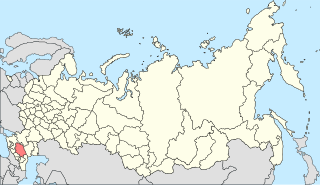Related Research Articles

Shamil Salmanovich Basayev, also known by his kunya "Abu Idris", was a senior military commander in the Chechen independence movement and terrorist. As a military commander in separatist armed forces of Chechnya, one of his most notable battles was the separatist recapture of Grozny in 1996, which he personally planned and commanded together with Aslan Maskhadov.
Black Widow or Shahidka, is a term for Islamist Chechen female suicide bombers, willing to be a manifestation of violent jihad. They became known at the Moscow theater hostage crisis of October 2002. The commander Shamil Basayev referred to the shahidkas as a part of force of his suicide bombers called the Riyad-us Saliheen Brigade of Martyrs. Basayev also stated that he himself trained at least fifty of the Black Widows. The female suicide bombers have carried out over 65% of the 23 terrorist attacks linked to the Chechen movement since 2000. The Black Widows are associated with terrorist attacks in Chechnya between 1999 and 2005.
Human rights violations were committed by the warring sides during the second war in Chechnya. Both Russian officials and Chechen rebels have been regularly and repeatedly accused of committing war crimes including kidnapping, torture, murder, hostage taking, looting, rape, decapitation, and assorted other breaches of the law of war. International and humanitarian organizations, including the Council of Europe and Amnesty International, have criticized both sides of the conflict for blatant and sustained violations of international humanitarian law.
In June 2000, the North Caucasian Chechen separatist-led Chechen insurgents added suicide bombing to their tactics in their struggle against Russia. Since then, there have been dozens of suicide attacks within and outside the republic of Chechnya, resulting in thousands of casualties among Russian security personnel and civilians. The profiles of the suicide bombers have varied, as have the circumstances surrounding the bombings.
Terrorism in Russia has a long history starting from the time of the Russian Empire. Terrorism, in the modern sense, means violence against civilians to achieve political or ideological objectives by creating extreme fear.

The February 2004 Moscow metro bombing occurred on 6 February 2004 when a male suicide bomber killed 41 people near Avtozavodskaya subway station on the Zamoskvoretskaya Line in Moscow. Up to 250 people were injured in the incident, some of the more common injuries being broken bones and smoke inhalation.
The Grozny truck bombing occurred on December 27, 2002, when three Chechen suicide bombers ran vehicles into the heavily guarded republic's government headquarters in the regional capital Grozny.

The insurgency in the North Caucasus was a low-level armed conflict between Russia and militants associated with the Caucasus Emirate and, from June 2015, Islamic State (IS) groups in the North Caucasus. It followed the official end of the decade-long Second Chechen War on 16 April 2009. It attracted people from the Middle East, North Africa, Europe, and Central Asia, who then participated in the conflict, but volunteers from the North Caucasus were also fighting in Syria. At the legislative level, the Second Chechen War and the hostilities described in this article are considered together as counter-terrorist operations on the territory of the North Caucasus region since August 1999.

The 2009 Nazran bombing occurred on 17 August 2009, in Nazran, the largest city of the Republic of Ingushetia in the Russian federation. A suicide car bomber attacked police headquarters, and at least 25 people were killed and 164 injured. It was the most serious terrorist attack in Ingushetia in the early 21st century, where there had been social and political unrest related to independence movements.

The 2010 Moscow Metro bombings were suicide bombings carried out by two Islamic female terrorists during the morning rush hour of March 29, 2010, at two stations of the Moscow Metro, with roughly 40 minutes in between. At least 40 people were killed, and over 100 injured.
The August 2004 Moscow metro bombing took place at about 20:17 MSK on 31 August 2004, when a female suicide bomber blew herself up outside Rizhskaya metro station, killing at least 10 people and wounding 50.

On 26 May 2010, at least seven people were killed in a bomb blast in Stavropol, Russia. At least 40 people were injured, one from Moscow, while another is an outsider, and another from Azerbaijan or Turkey. The blast occurred before a concert.
This is a list of terrorist attacks in Pakistan in the calendar year 2011.

The Islamic State – Caucasus Province was a branch of the militant Islamist group Islamic State (IS), that was active in the North Caucasus region of Russia. IS announced the group's formation on 23 June 2015 and appointed Rustam Asildarov as its leader. Although it was defeated by 2017, some lone wolves acted on behalf of the Caucasus Province for several years afterwards.

The December 2016 Aden suicide bombings were terrorist attacks that occurred on 10 December and 18 December 2016 targeted on Yemeni soldiers in Aden, the responsibility of bombing was claimed by Islamic State of Iraq and the Levant group, according to Amaq news agency. The suicide bombing occurred in a gathering of soldiers who were to receive their salaries on 10 December 2016. The blasts took place at same military base camps on 18 December 2016.
References
- ↑ Death of another victim takes Russian train blast toll to 46 [ permanent dead link ]
- ↑ "Чистосердечное признание пересмотру не подлежит" . Retrieved 29 March 2017.
- ↑ "36 killed in train blast near Chechnya" . Retrieved 29 March 2017.